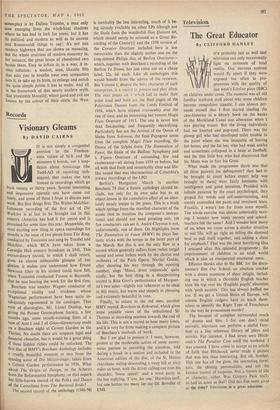Records
Visionary Gleams
By DAVID CAIRNS It is not simply a congenital aversion to the Franken- stein values of hi-fi and the monsters it breeds, nor a scep- ticism about Sonicstage (the Todd-AO of recording tech- niques), that makes one turn instead to recordings which go back twenty or thirty years. Several interesting and impressive operatic sets have come out lately, and some of these I hope to discuss next week. But first things first. The Walter-Melchior- Lehmann recording of the first act of Die Walkiire is at last to be brought out in this country (America has had it for years) and is Promised for some time this year. Meanwhile, the most exciting new thing in opera recordings for months is the issue of two pieces from The Ring, conducted by Toscanini and sung by Traubel and Melchior, which RCA have taken from a Carnegie Hall concert broadcast in 1941. This extraordinary record, to which I shall return, gives an almost unbearable glimpse of lost glories; it makes you understand how Ernest Newman (then in his sixties) could have felt, when Toscanini conducted Tristan at Bayreuth, that he was hearing the work for the first time.
Beecham was another Wagner conductor of exceptional vitality and vividness whose Wagnerian performances have been quite in- adequately represented in the catalogue. That emir of discologists, Mr. Lionel Dunlop, was giving the Putney Gramophone Society, a few months ago, some mouth-watering hints of a tape of Acts 1 and 2 of Giitterdlimmerung made on a Beecham night at Covent Garden in the Thirties. No doubt there are umpteen legal and financial obstacles, but it would be a great thing If these hidden riches could be unlocked. The first disc of HMV's Beecham Anthology includes a cruelly beautiful moment or two from the opening scene of Die Meistersinger, taken from a Covent Garden performance in 1936. What about The Origin of Design, or the Scherzo from the Reformation Symphony, or that superb but little-known record of the Polka and Dance of the Comedians from The Bartered Bride?
The second record of the anthology (1946-58) is inevitably the less interesting, much of it be- ing already available on other LPs (though not the finale from the wonderful Don Quixote set, which should surely be reissued as a Great Re- cording of the Century); and the 1958 version of the Corsaire Overture included here is less memorable than the slightly earlier one on the long-deleted Philips disc of Berlioz Overtures— which, together with Beecham's recording of the Berlioz Te Deum, has just come out on a cheap label, 22s. 6d. each. Like all anthologies this would benefit from the advice of the reviewer. But Volume 1, despite the bitty character of such enterprises, is a record to possess and play often. The only pieces on it which fail to make their point loud and bold are the final pages of the Polovtsian Dances from the Leeds Festival of 1934, which have slipped irrevocably over the rim of time, and an interesting but remote Magic Flute Overture of 1915. The rest is never less than fascinating, and frequently electrifying. Particularly fine are the Arrival of the Queen of Sheba from Solomon, the final Papageno scene from the complete Magic Flute recording, the Dance of the Sylphs from The Damnation of Faust, the finale of the Haffner Symphony and a Figaro Overture of astounding fire and exuberance—all dating from 1939 or before, but all with that fresh and remarkably clear and life- like sound that was characteristic of Columbia's prewar recordings of the LPO.
Berlioz's Hungarian March is another Beecham 78 that a future anthology should in- clude, not only for its own sake but as an object lesson in the cumulative effect of an abso- lutely steady tempo in the piece. This is a truth which springs from the manifest character of the music (not to mention the composer's instruc- tions) and should not need pointing out; yet few conductors can see it. Andre Cluytens is not, unfortunately, one of them. On Highlights from The Damnation of Faust (HMV) he plays fan- tastic tricks with the tempo in the latter part of the March. But this is not the only flaw in a record which generally suffers from rather turgid sound and some listless work by the chorus and orchestra of the Paris Opera. Nicolai Gedda, after shouting his way through the opening number, sings Nerd, doux crepuscule' quite nicely, but the best thing in a disappointing record is Rita Gorr's performance of Marguer- ite's two arias—slightly too vehement to be ideal in this music, but warm and shapely in phrasing and extremely beautiful in tone.
Finally, to return to the old men, another HMV record, Beecham in Rehearsal, which gives some amiable views of the unbuttoned Sir Thomas at recording sessions towards the end of his life. This is not a record to hear many times, and it is very far from making a complete picture of Beecham's methods of work.
But I am glad to possess it. I must, however, protest at the intolerable action of some anony- mous puritan in censoring the anecdote, told during a break in a session and included in the American edition of the disc, of the St. Helens charabanc outing descending a steep hill at sixty miles an hour, with the driver calling out over his shoulder, 'Some speed!' and a stout party in the bus replying, 'I 'ave, for one.' Harmless stuff, but one button too many for our Dr. Bowdler of EMI.






































 Previous page
Previous page